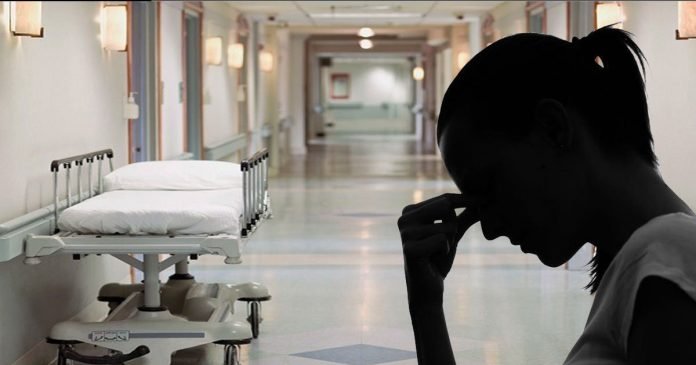MPs have backed a ban on virginity testing in England, after the government called it “indefensible”.
Anyone helping girls or women get the tests, which includes an intrusive vaginal examination, could face up to five years in prison.
Health Minister Edward Argar told the House of Commons the practice was “repressive” and caused “long-term physical and psychological damage”.
The intrusive tests are considered a violation of human rights by the World Health Organization (WHO) and United Nations, which want to see them banned.
Critics say they are unscientific, cannot prove whether someone is a virgin and can be a form of abuse.
It adds that the tests, thought to occur in at least 20 countries, cannot prove whether a woman or girl has had sex or not, as the hymen can be broken in other ways – such as through tampon use or exercise.
But a BBC Newsbeat investigation last year found 21 clinics in the UK offering them, at a cost of between £150 and £300.
Virginity testing is often associated with cultural norms that expose women and girls to stigma, and perceived shame and dishonour to themselves, their families and communities.
Women or girls can be ostracised or even killed because they have had (or are believed to have had) sexual intercourse outside of cultural norms – for example, before marriage.
Child marriage is even used in some communities as a “protective” measure to avoid the shame and consequences of a girl having sexual intercourse before marriage.
Between 2020 and 2021, the Karma Nirvana helpline supported 41 women where “sex before marriage” was the motive for abuse from perpetrators.
Women’s rights groups such as Karma Nirvana, IKWRO and MEWSo have campaigned for the procedure to be banned, and this has been backed by the Royal College of Obstetricians and Gynaecologists and the Royal College of Midwives.
An amendment to the Health and Care Bill banning virginity tests was passed unopposed by the Commons.
This would make it a criminal offence to offer someone from England a test, or help them get one in the UK or abroad.
Controversial “virginity tests,” which involve intrusive and unscientific examinations, are being offered by medical clinics around Britain, according to an investigation.
The test claims to determine if a woman’s hymen is intact and is considered a violation of human rights by the World Health Organization and the United Nations.
Despite this, the BBC identified several private clinics across the country that confirmed they offer the procedure — which doctors say provides no evidence as to whether a woman has had sex or not.
“The whole idea the absence of part of the hymen means you’re not a virgin is wrong first of all. It can be torn for various reasons, and if I was to say ‘it is torn, I need to repair it’ and then I can give you a certificate, that means I am giving a false certificate,” Dr. Ashfaq Khan, a gynaecologist, told the broadcaster, adding that he regularly gets requests from patients for virginity testing, as well as for “virginity repair.”
According to data from the UK’s National Health Service, 69 hymen-repair procedures have been carried out in the past five years, the BBC reports.
Last year the rapper Clifford Joseph Harris Jr., better known by the stage names T.I. and Tip, an American rapper, earned the ire of the internet and fans alike by revealing on the “Ladies Like Us” podcast that he takes his daughter to “yearly trips to the gynaecologist to check her hymen,” adding: “I will say, as of her 18th birthday, her hymen is still intact.”
The maximum penalty would be a five-year jail sentence or an unlimited fine.
Mr Argar said the ban had been discussed with ministers in Scotland, Wales and Northern Ireland, who all wanted to “ensure the whole of the UK together tackles this abhorrent practice”.
Creating a criminal offence would “begin to tackle the harmful misconceptions that surround a woman’s sexuality”, he argued.
Mr Argar added: “This House’s commitment to legislate, I believe, is a profoundly important step forward in helping to tackle the damaging myths concerning so-called purity in women’s sexuality.
“In response to concerns that vulnerable women and girls will be taken abroad and subjected to virginity testing abroad once the offence is banned in the UK, these offences will also carry extra-territorial jurisdiction.”
Campaigners have also said they want a ban on hymenoplasty, a practice involving cosmetic surgery to reconstruct the hymen.
The government has indicated it wants to outlaw this as well, but it is awaiting the recommendations of an independent panel which is due to report back before Christmas.
The amendments to the Health and Care bill make it illegal to “make examinations that falsely claim to be able to determine whether a women or a girl has had vaginal intercourse by examining the female genitalia”.
Halaleh Taheri, founder and executive director of MEWSo (Middle Eastern Women and Society) said the move was welcome, but she wanted to see more done.
“These abusive practices should have been stopped long ago,” she said. The ban on virginity testing passing through Parliament is a promising first step, but we must not stop until Hymenoplasty is banned too. The job is not done yet.
“Now it is the responsibility of the community leaders and the Government to reshape misguided attitudes about women’s virginity and sexual control”.
Janet Fyle, a professional advisor at the Royal College of Midwives said: “We are pleased that this harmful practice has been banned and urge the Government to put in place measures to ensure that girls and women are protected from these abuses.
“They are mostly coerced into undergoing this in the name of honour. This is another example of violence and abuse of women and young girls and one that has no place in a modern and equal society.”
Dr Edward Morris, president of the Royal College of Obstetricians and Gynaecologists agreed, adding: “While this is one step closer to making virginity testing illegal, it is vital that we also ban hymenoplasty. These two practices are inextricably linked, and we are concerned that it is often women in vulnerable situations who are seeking these procedures.
“We condemn both as unnecessary and unacceptable.”
Support Independent Journalism Today
Our unwavering dedication is to provide you with unbiased news, diverse perspectives, and insightful opinions. We're on a mission to ensure that those in positions of power are held accountable for their actions, but we can't do it alone. Labour Heartlands is primarily funded by me, Paul Knaggs, and by the generous contributions of readers like you. Your donations keep us going and help us uphold the principles of independent journalism. Join us in our quest for truth, transparency, and accountability – donate today and be a part of our mission!
Like everyone else, we're facing challenges, and we need your help to stay online and continue providing crucial journalism. Every contribution, no matter how small, goes a long way in helping us thrive. By becoming one of our donors, you become a vital part of our mission to uncover the truth and uphold the values of democracy.
While we maintain our independence from political affiliations, we stand united against corruption, injustice, and the erosion of free speech, truth, and democracy. We believe in the power of accurate information in a democracy, and we consider facts non-negotiable.
Your support, no matter the amount, can make a significant impact. Together, we can make a difference and continue our journey toward a more informed and just society.
Thank you for supporting Labour Heartlands













